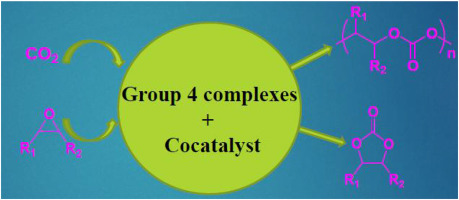Journal of Organometallic Chemistry ( IF 2.3 ) Pub Date : 2019-12-09 , DOI: 10.1016/j.jorganchem.2019.121067 Mrinmay Mandal

|
Group 4 complexes, especially titanium, are soil compostable and nontoxic to the soil environment. Hence, group 4 complexes as catalysts are the perfect alternative for the copolymerization and coupling of epoxides and CO2. This review reports the use of group 4 metals as Lewis acid catalysts for the synthesis of polycarbonates (PCs) and cyclic carbonates (CCs) by the copolymerization and cycloaddition of epoxides and CO2 respectively. A comparison between numerous group 4 catalysts has been drawn for their catalytic activities using diverse ligand systems. The catalysts reactivity in terms of molecular weight (Mn) of copolymers, carbonate linkages, the selectivity of PCs over CCs, turn over frequency (TOF) have been discussed in detail. The effect of using additives (nucleophilic cocatalysts) for the copolymerization and coupling reactions has also been investigated.
中文翻译:

第4组络合物作为催化剂将CO 2转化为聚碳酸酯和环状碳酸酯
第4组配合物(尤其是钛)可在土壤中堆肥,并且对土壤环境无毒。因此,第4族配合物作为催化剂是环氧化物和CO 2的共聚和偶联的理想选择。这篇综述报道了使用第4组金属作为路易斯酸催化剂,分别通过环氧化物和CO 2的共聚和环加成反应来合成聚碳酸酯(PC)和环状碳酸酯(CC)。使用不同的配体体系,已经对众多第4组催化剂之间的催化活性进行了比较。催化剂的反应活性,以分子量(M n),碳酸酯键,PC对CC的选择性,转换频率(TOF)进行了详细讨论。还研究了使用添加剂(亲核助催化剂)进行共聚和偶联反应的效果。


























 京公网安备 11010802027423号
京公网安备 11010802027423号